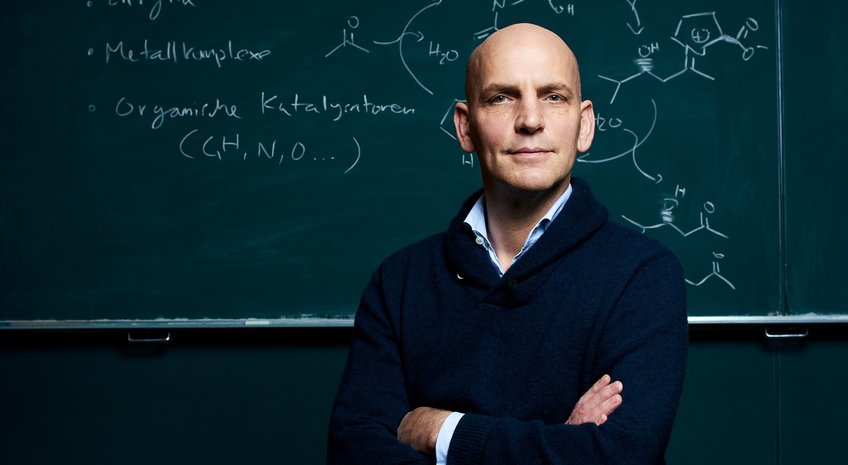
A Pioneer of Asymmetric Catalysis
Prof. Benjamin List was awarded the Chemistry Nobel Prize in 2021
In December 2021, Prof. Dr. Benjamin List, Head of the Department of Homogeneous Catalysis and Director at the Max-Planck-Institut für Kohlenforschung, was awarded the Nobel Prize in Chemistry. On this page you will find some information, pictures and videos about his research and the awarding of the Nobel Prize.
Benjamin List, Director at the Max-Planck-Institut für Kohlenforschung, was honoured with the 2021 Nobel Prize in Chemistry, together with David MacMillan from Princeton University, for their work on asymmetric catalysis. They have established for the first time that small organic molecules are suitable as mediators of chemical reactions. Previously, science assumed that only enzymes and metals, including often toxic heavy metals or expensive and rare precious metals, could accelerate chemical reactions and steer them in a desired direction. With his publication Proline-Catalyzed Direct Asymmetric Aldol Reactions in Journal of the American Chemical Society, List showed that there is more to be discovered.
Nobel Prize lecture: Benjamin List, Nobel Prize in chemistry 2021
The small organic molecules that Benjamin List and David MacMillan introduced as catalysts are particularly suitable for asymmetric synthesis. In this process, only one of two enantiomers is produced - these are molecules that are like the left and right hand, which means they cannot be spatially aligned. Such molecules are involved in all biological processes and also play an important role as medical agents.
Left or right hand? We all find out that there is a big difference when we try to write with the hand we are not used to. Thing are no different in chemistry. Many molecules, especially those that are involved in biological processes, exist in the form of two enantiomers that are as similar as the left and right hand - that is why such substances are called chiral (Greek for hand). Just as our two hands have five fingers, these molecules also resemble each other in structure at first glance. But like the fingers, the individual components of chiral molecules are arranged in mirror image. And in biology in particular, this often makes a big difference: for example, one variant of the chemical substance limonene smells like lemon, the other like orange. One form of the amino acid valine tastes bitter, the other sweet.
In medicine, it is particularly important to take into account the different effects of enantiomers. However, many catalysts equally produce both forms of a chiral molecule. In asymmetric catalysis, where only one of the two variants is produced, the discoveries of Benjamin List and David MacMillan have opened up completely new possibilities. For example, the proline used by Ben List as a catalyst plays a crucial role in the production of an drug against AIDS.
An overview of the current research projects of Benjamin List's working group can be found on the page of the Department of Homogeneous Catalysis. Current news from the List working group can also be found on Twitter.



